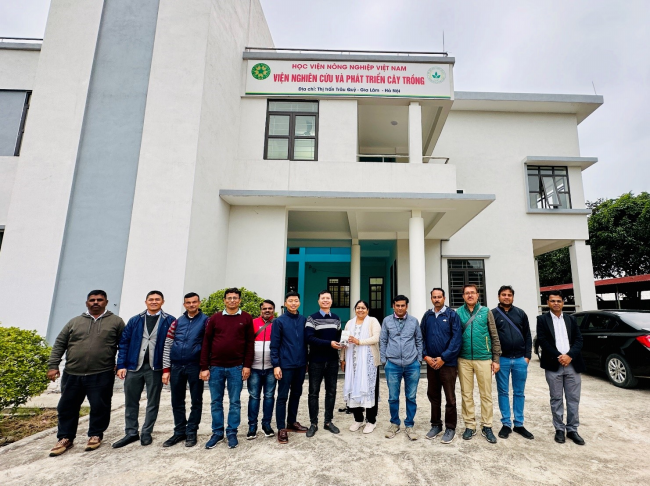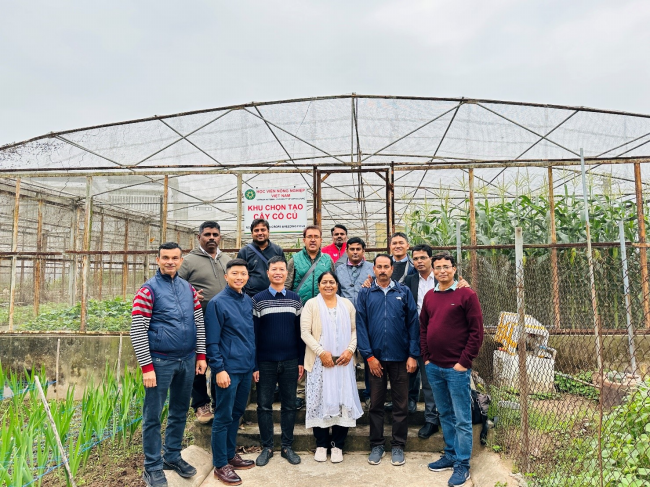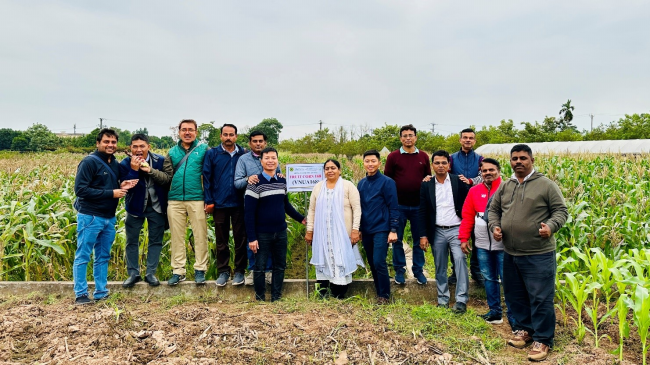On December 19, 2023, during a business trip to Vietnam National University of Agriculture (VNUA), a delegation of professors and assistant professors from two universities in India visited and had discussion with the Institute of Crops Research and Development (VNUA) on the potential for scientific research cooperation in agriculture between the parties. India had strengths and traditions in breeding hybrid vegetable varieties and root and tuber crops while the Institute for Research and Development (VNUA) was the lead in breeding hybrid rice and food corn varieties. This was the basis for promoting cooperation, complementarity, and mutual supports in research, selection, and improvement of plant varieties, bringing benefits to both countries, contributing to improving the ability to adapt to climate change and ensuring global food security.
    |
 |
| Dr. Pham Quang Tuan gives a gift to the delegation of Indian professors and assistant professors |
During a business trip and visit to VNUA, ten professors and assistant professors from Dr. Balasaheb Sawant Konkan Krishi Vidyapeeth Dapoli (Agricultural University), Maharashtra and Jawaharlal Nehru Agricultural University, Jabalpur, India, visited and discussed with the Institute of Crops Research and Development (VNUA) about the potential for cooperation in agricultural scientific research between the two countries. Welcoming the delegation were Dr. Pham Quang Tuan, Vice Director of the Institute of Crops Research and Development and MSc. Nguyen Trung Duc, Head of the Strong research group "Research and Development of Potential Root and Tuber Crops", VNUA. At the meeting, on behalf of the Institute's Board of Directors, Dr. Pham Quang Tuan warmly welcomed the delegation to visit the Institute and summarized the scientific and technological achievements and research strategies of the Institute of Crops Research and Development. The Crops Institute of Research and Development, VNUA, was a leading unit in the research and selection of hybrid rice varieties and high-quality food corn, fresh-eating corn varieties rich in anthocyanins and carotenoids in Vietnam. The Institute bred and facilitated the recognition of circulation many new corn and rice varieties that had become popular in mass production. Currently, Vietnamese agriculture was very interested in developing varieties of vegetables, flowers, and root and tuber crops (i.e., sweet potatoes, potatoes, and cassava) to serve domestic needs. Through this meeting, Dr. Pham Quang Tuan was eager to promote cooperation between the two sides in this field. Representative of the Indian delegation, Prof. Anita Babbar of the Department of Genetics and Plant Breeding, Jawaharlal Nehru Agricultural University, Jabalpur, respectfully thanked the Institute for the warm welcome and introduced the delegation including many different majors such as fisheries, forestry, statistics, physiology, food technology, biotechnology, soil science, and plant pathology.
    |
 |
| The delegation of Indian professors and assistant professors visit the root and tuber crops breeding area |
In India, most people were vegetarian. In addition to milk, nuts, vegetables, and fruits were the main sources of protein and nutrition. The selection of vegetable and root crop varieties had a tradition and was India's strength as compared to other countries. Currently, breeding strategies were focusing on improving the nutritional content of crops, improving the efficiency of resource use (land, water, and fertilizers, etc.), saving inputs and developing the superfood group. The fresh corn varieties rich in anthocyanin and carotenoids that the Institute of Crops Research and Development, VNUA, selected might have great potential for development in the Indian market. In addition, root and tuber crops such as sweet potatoes, potatoes, and cassava were also being researched very strongly in India. Sweet potatoes, potatoes, and cassava were not only a source of food but also helped improve farmers' income, enhance food security and nutrition, create jobs in the agricultural sector, and improve the livelihoods of poor farmers. Therefore, these crops were also paid much attention in terms of large investment in big and methodical research projects with the goal of developing the market along the chain. Regarding the opportunities for cooperation and exchange of researchers, the Indian government was currently sponsoring many short-term training programs for ASEAN countries, including Vietnam, such as the ITEC program and the Asean-India research training fellowship (AI-RTF), and there were also many undergraduate and graduate scholarships to study in India. The opportunities for cooperation, exchange and exchange of experts at universities and research institutes between the two countries were huge.
    |
 |
| The delegation of Indian professors and assistant professors visit the food corn varieties selection area |
The discussion took place very enthusiastically, with both sides sharing a lot of useful information. This was the basis for promoting cooperation, complementarity, and mutual support in staff training, research, selection, and improvement of plant varieties, bringing benefits to both countries, contributing to improving ability to adapt to climate change and ensure global food security. The delegation of Indian professors and assistant professors agreed with the Institute of Crops Research and Development (VNUA) to promote cooperation through official channels, in accordance with the laws of both countries in the coming time.